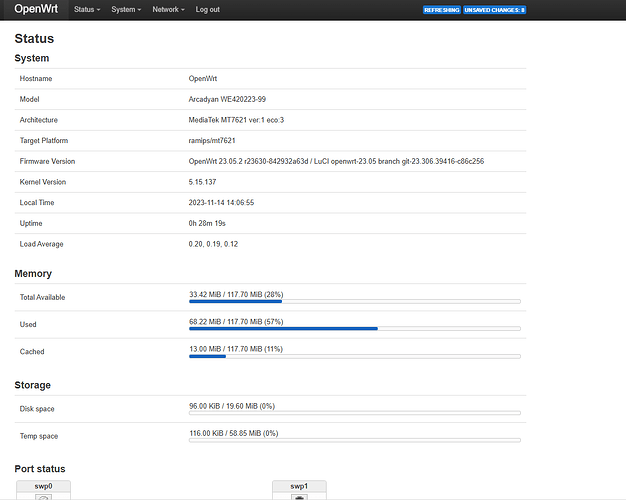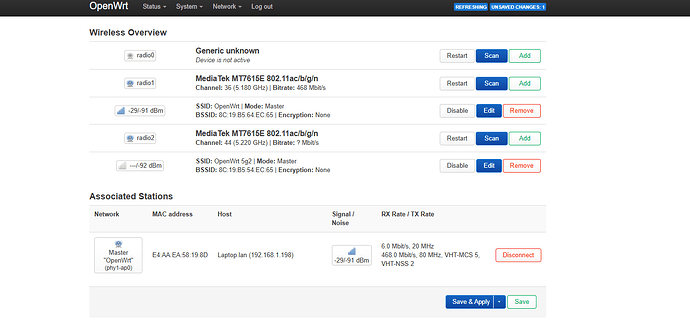jdwl1o1:
bootlog - I
Kernellog:
[ 0.000000] Linux version 5.15.137 (builder@buildhost) (mipsel-openwrt-linux-musl-gcc (OpenWrt GCC 12.3.0 r23630-842932a63d) 12.3.0, GNU ld (GNU Binutils) 2.40.0) #0 SMP Tue Nov 14 13:38:11 2023
[ 0.000000] SoC Type: MediaTek MT7621 ver:1 eco:3
[ 0.000000] printk: bootconsole [early0] enabled
[ 0.000000] CPU0 revision is: 0001992f (MIPS 1004Kc)
[ 0.000000] MIPS: machine is Arcadyan WE420223-99
[ 0.000000] Initrd not found or empty - disabling initrd
[ 0.000000] VPE topology {2,2} total 4
[ 0.000000] Primary instruction cache 32kB, VIPT, 4-way, linesize 32 bytes.
[ 0.000000] Primary data cache 32kB, 4-way, PIPT, no aliases, linesize 32 bytes
[ 0.000000] MIPS secondary cache 256kB, 8-way, linesize 32 bytes.
[ 0.000000] Zone ranges:
[ 0.000000] Normal [mem 0x0000000000000000-0x0000000007ffffff]
[ 0.000000] Movable zone start for each node
[ 0.000000] Early memory node ranges
[ 0.000000] node 0: [mem 0x0000000000000000-0x0000000007ffffff]
[ 0.000000] Initmem setup node 0 [mem 0x0000000000000000-0x0000000007ffffff]
[ 0.000000] percpu: Embedded 11 pages/cpu s14736 r8192 d22128 u45056
[ 0.000000] pcpu-alloc: s14736 r8192 d22128 u45056 alloc=11*4096
[ 0.000000] pcpu-alloc: [0] 0 [0] 1 [0] 2 [0] 3
[ 0.000000] Built 1 zonelists, mobility grouping on. Total pages: 32480
[ 0.000000] Kernel command line: console=ttyS0,57600 ubi.mtd=5 root=/dev/ubiblock0_0 rootfstype=squashfs,jffs2
[ 0.000000] Dentry cache hash table entries: 16384 (order: 4, 65536 bytes, linear)
[ 0.000000] Inode-cache hash table entries: 8192 (order: 3, 32768 bytes, linear)
[ 0.000000] Writing ErrCtl register=00018100
[ 0.000000] Readback ErrCtl register=00018100
[ 0.000000] mem auto-init: stack:off, heap alloc:off, heap free:off
[ 0.000000] Memory: 119296K/131072K available (7300K kernel code, 624K rwdata, 880K rodata, 1232K init, 226K bss, 11776K reserved, 0K cma-reserved)
[ 0.000000] SLUB: HWalign=32, Order=0-3, MinObjects=0, CPUs=4, Nodes=1
[ 0.000000] rcu: Hierarchical RCU implementation.
[ 0.000000] Tracing variant of Tasks RCU enabled.
[ 0.000000] rcu: RCU calculated value of scheduler-enlistment delay is 10 jiffies.
[ 0.000000] NR_IRQS: 256
[ 0.000000] clocksource: GIC: mask: 0xffffffffffffffff max_cycles: 0xcaf478abb4, max_idle_ns: 440795247997 ns
[ 0.000004] sched_clock: 64 bits at 880MHz, resolution 1ns, wraps every 4398046511103ns
[ 0.016022] Calibrating delay loop... 586.13 BogoMIPS (lpj=2930688)
[ 0.088328] pid_max: default: 32768 minimum: 301
[ 0.098276] Mount-cache hash table entries: 1024 (order: 0, 4096 bytes, linear)
[ 0.112693] Mountpoint-cache hash table entries: 1024 (order: 0, 4096 bytes, linear)
[ 0.131880] rcu: Hierarchical SRCU implementation.
[ 0.142105] smp: Bringing up secondary CPUs ...
[ 0.151882] Primary instruction cache 32kB, VIPT, 4-way, linesize 32 bytes.
[ 0.151910] Primary data cache 32kB, 4-way, PIPT, no aliases, linesize 32 bytes
[ 0.151925] MIPS secondary cache 256kB, 8-way, linesize 32 bytes.
[ 0.151969] CPU1 revision is: 0001992f (MIPS 1004Kc)
[ 0.211634] Synchronize counters for CPU 1: done.
[ 0.273856] Primary instruction cache 32kB, VIPT, 4-way, linesize 32 bytes.
[ 0.273880] Primary data cache 32kB, 4-way, PIPT, no aliases, linesize 32 bytes
[ 0.273891] MIPS secondary cache 256kB, 8-way, linesize 32 bytes.
[ 0.273919] CPU2 revision is: 0001992f (MIPS 1004Kc)
[ 0.332828] Synchronize counters for CPU 2: done.
[ 0.393222] Primary instruction cache 32kB, VIPT, 4-way, linesize 32 bytes.
[ 0.393243] Primary data cache 32kB, 4-way, PIPT, no aliases, linesize 32 bytes
[ 0.393255] MIPS secondary cache 256kB, 8-way, linesize 32 bytes.
[ 0.393286] CPU3 revision is: 0001992f (MIPS 1004Kc)
[ 0.452403] Synchronize counters for CPU 3: done.
[ 0.512000] smp: Brought up 1 node, 4 CPUs
[ 0.525374] clocksource: jiffies: mask: 0xffffffff max_cycles: 0xffffffff, max_idle_ns: 19112604462750000 ns
[ 0.544869] futex hash table entries: 1024 (order: 3, 32768 bytes, linear)
[ 0.558772] pinctrl core: initialized pinctrl subsystem
[ 0.570690] NET: Registered PF_NETLINK/PF_ROUTE protocol family
[ 0.583197] thermal_sys: Registered thermal governor 'step_wise'
[ 0.585894] rt2880-pinmux pinctrl: there is not valid maps for state default
[ 0.615004] FPU Affinity set after 11720 emulations
[ 0.627925] clocksource: Switched to clocksource GIC
[ 0.639272] NET: Registered PF_INET protocol family
[ 0.649051] IP idents hash table entries: 2048 (order: 2, 16384 bytes, linear)
[ 0.664297] tcp_listen_portaddr_hash hash table entries: 512 (order: 0, 6144 bytes, linear)
[ 0.680846] Table-perturb hash table entries: 65536 (order: 6, 262144 bytes, linear)
[ 0.696194] TCP established hash table entries: 1024 (order: 0, 4096 bytes, linear)
[ 0.711399] TCP bind hash table entries: 1024 (order: 1, 8192 bytes, linear)
[ 0.725395] TCP: Hash tables configured (established 1024 bind 1024)
[ 0.738174] UDP hash table entries: 256 (order: 1, 8192 bytes, linear)
[ 0.751073] UDP-Lite hash table entries: 256 (order: 1, 8192 bytes, linear)
[ 0.765252] NET: Registered PF_UNIX/PF_LOCAL protocol family
[ 0.776473] PCI: CLS 0 bytes, default 32
[ 0.786913] workingset: timestamp_bits=14 max_order=15 bucket_order=1
[ 0.805010] squashfs: version 4.0 (2009/01/31) Phillip Lougher
[ 0.816517] jffs2: version 2.2 (NAND) (SUMMARY) (LZMA) (RTIME) (CMODE_PRIORITY) (c) 2001-2006 Red Hat, Inc.
[ 0.837372] Block layer SCSI generic (bsg) driver version 0.4 loaded (major 251)
[ 0.855877] mt7621_gpio 1e000600.gpio: registering 32 gpios
[ 0.867298] mt7621_gpio 1e000600.gpio: registering 32 gpios
[ 0.878733] mt7621_gpio 1e000600.gpio: registering 32 gpios
[ 0.890239] mt7621-pci 1e140000.pcie: host bridge /pcie@1e140000 ranges:
[ 0.903501] mt7621-pci 1e140000.pcie: No bus range found for /pcie@1e140000, using [bus 00-ff]
[ 0.920971] mt7621-pci 1e140000.pcie: MEM 0x0060000000..0x006fffffff -> 0x0060000000
[ 0.937185] mt7621-pci 1e140000.pcie: IO 0x001e160000..0x001e16ffff -> 0x0000000000
[ 1.307994] mt7621-pci 1e140000.pcie: pcie2 no card, disable it (RST & CLK)
[ 1.321764] mt7621-pci 1e140000.pcie: PCIE0 enabled
[ 1.331426] mt7621-pci 1e140000.pcie: PCIE1 enabled
[ 1.341125] PCI coherence region base: 0x60000000, mask/settings: 0xf0000002
[ 1.355262] mt7621-pci 1e140000.pcie: PCI host bridge to bus 0000:00
[ 1.367780] pci_bus 0000:00: root bus resource [bus 00-ff]
[ 1.378661] pci_bus 0000:00: root bus resource [mem 0x60000000-0x6fffffff]
[ 1.392307] pci_bus 0000:00: root bus resource [io 0x0000-0xffff]
[ 1.404619] pci 0000:00:00.0: [0e8d:0801] type 01 class 0x060400
[ 1.416515] pci 0000:00:00.0: reg 0x10: [mem 0x00000000-0x7fffffff]
[ 1.428951] pci 0000:00:00.0: reg 0x14: [mem 0x60400000-0x6040ffff]
[ 1.441453] pci 0000:00:00.0: supports D1
[ 1.449332] pci 0000:00:00.0: PME# supported from D0 D1 D3hot
[ 1.461527] pci 0000:00:01.0: [0e8d:0801] type 01 class 0x060400
[ 1.473443] pci 0000:00:01.0: reg 0x10: [mem 0x00000000-0x7fffffff]
[ 1.485831] pci 0000:00:01.0: reg 0x14: [mem 0x60410000-0x6041ffff]
[ 1.498344] pci 0000:00:01.0: supports D1
[ 1.506189] pci 0000:00:01.0: PME# supported from D0 D1 D3hot
[ 1.519785] pci 0000:01:00.0: [14c3:7615] type 00 class 0x000280
[ 1.531685] pci 0000:01:00.0: reg 0x10: [mem 0x00000000-0x000fffff 64bit]
[ 1.545272] pci 0000:01:00.0: 2.000 Gb/s available PCIe bandwidth, limited by 2.5 GT/s PCIe x1 link at 0000:00:00.0 (capable of 4.000 Gb/s with 5.0 GT/s PCIe x1 link)
[ 1.576134] pci 0000:00:00.0: PCI bridge to [bus 01-ff]
[ 1.586439] pci 0000:00:00.0: bridge window [io 0x0000-0x0fff]
[ 1.598511] pci 0000:00:00.0: bridge window [mem 0x60000000-0x600fffff]
[ 1.611990] pci 0000:00:00.0: bridge window [mem 0x60100000-0x601fffff pref]
[ 1.626335] pci_bus 0000:01: busn_res: [bus 01-ff] end is updated to 01
[ 1.639771] pci 0000:02:00.0: [14c3:7615] type 00 class 0x000280
[ 1.651649] pci 0000:02:00.0: reg 0x10: [mem 0x00000000-0x000fffff 64bit]
[ 1.665236] pci 0000:02:00.0: 2.000 Gb/s available PCIe bandwidth, limited by 2.5 GT/s PCIe x1 link at 0000:00:01.0 (capable of 4.000 Gb/s with 5.0 GT/s PCIe x1 link)
[ 1.696117] pci 0000:00:01.0: PCI bridge to [bus 02-ff]
[ 1.706433] pci 0000:00:01.0: bridge window [io 0x0000-0x0fff]
[ 1.718496] pci 0000:00:01.0: bridge window [mem 0x60200000-0x602fffff]
[ 1.731974] pci 0000:00:01.0: bridge window [mem 0x60300000-0x603fffff pref]
[ 1.746319] pci_bus 0000:02: busn_res: [bus 02-ff] end is updated to 02
[ 1.759502] pci 0000:00:00.0: BAR 0: no space for [mem size 0x80000000]
[ 1.772580] pci 0000:00:00.0: BAR 0: failed to assign [mem size 0x80000000]
[ 1.786406] pci 0000:00:01.0: BAR 0: no space for [mem size 0x80000000]
[ 1.799535] pci 0000:00:01.0: BAR 0: failed to assign [mem size 0x80000000]
[ 1.813371] pci 0000:00:00.0: BAR 8: assigned [mem 0x60000000-0x600fffff]
[ 1.826849] pci 0000:00:00.0: BAR 9: assigned [mem 0x60100000-0x601fffff pref]
[ 1.841184] pci 0000:00:01.0: BAR 8: assigned [mem 0x60200000-0x602fffff]
[ 1.854664] pci 0000:00:01.0: BAR 9: assigned [mem 0x60300000-0x603fffff pref]
[ 1.869004] pci 0000:00:00.0: BAR 1: assigned [mem 0x60400000-0x6040ffff]
[ 1.882495] pci 0000:00:01.0: BAR 1: assigned [mem 0x60410000-0x6041ffff]
[ 1.895964] pci 0000:00:00.0: BAR 7: assigned [io 0x0000-0x0fff]
[ 1.908057] pci 0000:00:01.0: BAR 7: assigned [io 0x1000-0x1fff]
[ 1.920162] pci 0000:01:00.0: BAR 0: assigned [mem 0x60000000-0x600fffff 64bit]
[ 1.934684] pci 0000:00:00.0: PCI bridge to [bus 01]
[ 1.944524] pci 0000:00:00.0: bridge window [io 0x0000-0x0fff]
[ 1.956614] pci 0000:00:00.0: bridge window [mem 0x60000000-0x600fffff]
[ 1.970090] pci 0000:00:00.0: bridge window [mem 0x60100000-0x601fffff pref]
[ 1.984441] pci 0000:02:00.0: BAR 0: assigned [mem 0x60200000-0x602fffff 64bit]
[ 1.998966] pci 0000:00:01.0: PCI bridge to [bus 02]
[ 2.008798] pci 0000:00:01.0: bridge window [io 0x1000-0x1fff]
[ 2.020895] pci 0000:00:01.0: bridge window [mem 0x60200000-0x602fffff]
[ 2.034374] pci 0000:00:01.0: bridge window [mem 0x60300000-0x603fffff pref]
[ 2.051303] Serial: 8250/16550 driver, 16 ports, IRQ sharing enabled
[ 2.068900] printk: console [ttyS0] disabled
[ 2.077371] 1e000c00.uartlite: ttyS0 at MMIO 0x1e000c00 (irq = 19, base_baud = 3125000) is a 16550A
[ 2.095328] printk: console [ttyS0] enabled
[ 2.111851] printk: bootconsole [early0] disabled
[ 2.134166] spi-mt7621 1e000b00.spi: sys_freq: 220000000
[ 2.146303] spi-nor spi0.0: w25q256 (32768 Kbytes)
[ 2.156022] 12 fixed-partitions partitions found on MTD device spi0.0
[ 2.168871] Creating 12 MTD partitions on "spi0.0":
[ 2.178590] 0x000000000000-0x000002000000 : "ALL"
[ 2.189090] 0x000000000000-0x000000030000 : "Bootloader"
[ 2.200869] 0x000000030000-0x000000040000 : "Config"
[ 2.211847] 0x000000040000-0x000000050000 : "Factory"
[ 2.222925] 0x000000050000-0x000001fb0000 : "kernel"
[ 2.233826] 0x000000490000-0x000001fb0000 : "rootfs"
[ 2.244716] mtd: setting mtd5 (rootfs) as root device
[ 2.254923] mtdsplit: no squashfs found in "rootfs"
[ 2.264698] 0x000001000000-0x000001fb0000 : "Kernel2"
[ 2.275882] 0x000001440000-0x000001fb0000 : "RootFS2"
[ 2.287006] 0x000001fb0000-0x000001fc0000 : "glbcfg"
[ 2.298216] 0x000001fc0000-0x000001fd0000 : "board_data"
[ 2.310073] 0x000001fd0000-0x000001fe0000 : "glbcfg2"
[ 2.321251] 0x000001fe0000-0x000001ff0000 : "board_data2"
[ 2.469255] mtk_soc_eth 1e100000.ethernet: generated random MAC address ae:99:2d:f2:08:f6
[ 2.485754] mtk_soc_eth 1e100000.ethernet: generated random MAC address c2:de:68:47:42:fa
[ 2.503451] mt7530-mdio mdio-bus:1f: MT7530 adapts as multi-chip module
[ 2.523815] mtk_soc_eth 1e100000.ethernet eth0: mediatek frame engine at 0xbe100000, irq 20
[ 2.543669] mtk_soc_eth 1e100000.ethernet swp0: mediatek frame engine at 0xbe100000, irq 20
[ 2.562372] i2c_dev: i2c /dev entries driver
[ 2.574046] NET: Registered PF_INET6 protocol family
[ 2.586628] Segment Routing with IPv6
[ 2.594085] In-situ OAM (IOAM) with IPv6
[ 2.602061] NET: Registered PF_PACKET protocol family
[ 2.612292] bridge: filtering via arp/ip/ip6tables is no longer available by default. Update your scripts to load br_netfilter if you need this.
[ 2.638799] 8021q: 802.1Q VLAN Support v1.8
[ 2.653128] mt7530-mdio mdio-bus:1f: MT7530 adapts as multi-chip module
[ 2.682501] mt7530-mdio mdio-bus:1f: configuring for fixed/rgmii link mode
[ 2.697083] mt7530-mdio mdio-bus:1f: Link is Up - 1Gbps/Full - flow control rx/tx
[ 2.699118] mt7530-mdio mdio-bus:1f swp1 (uninitialized): PHY [mt7530-0:01] driver [MediaTek MT7530 PHY] (irq=22)
[ 2.735853] DSA: tree 0 setup
[ 2.742837] ubi0: attaching mtd5
[ 2.784908] ubi0: scanning is finished
[ 2.805071] ubi0: attached mtd5 (name "rootfs", size 27 MiB)
[ 2.816426] ubi0: PEB size: 65536 bytes (64 KiB), LEB size: 65408 bytes
[ 2.829629] ubi0: min./max. I/O unit sizes: 1/256, sub-page size 1
[ 2.841941] ubi0: VID header offset: 64 (aligned 64), data offset: 128
[ 2.854945] ubi0: good PEBs: 434, bad PEBs: 0, corrupted PEBs: 0
[ 2.866910] ubi0: user volume: 2, internal volumes: 1, max. volumes count: 128
[ 2.881300] ubi0: max/mean erase counter: 2/0, WL threshold: 4096, image sequence number: 1699969091
[ 2.899495] ubi0: available PEBs: 0, total reserved PEBs: 434, PEBs reserved for bad PEB handling: 0
[ 2.917718] ubi0: background thread "ubi_bgt0d" started, PID 328
[ 2.919622] block ubiblock0_0: created from ubi0:0(rootfs)
[ 2.948478] VFS: Mounted root (squashfs filesystem) readonly on device 254:0.
[ 2.966715] Freeing unused kernel image (initmem) memory: 1232K
[ 2.978575] This architecture does not have kernel memory protection.
[ 2.991427] Run /sbin/init as init process
[ 2.999595] with arguments:
[ 2.999604] /sbin/init
[ 2.999610] with environment:
[ 2.999615] HOME=/
[ 2.999620] TERM=linux
[ 3.397987] init: Console is alive
[ 3.405237] init: - watchdog -
[ 4.018077] kmodloader: loading kernel modules from /etc/modules-boot.d/*
[ 4.076367] kmodloader: done loading kernel modules from /etc/modules-boot.d/*
[ 4.093103] init: - preinit -
[ 4.821170] random: jshn: uninitialized urandom read (4 bytes read)
[ 4.941522] random: jshn: uninitialized urandom read (4 bytes read)
[ 5.057613] random: jshn: uninitialized urandom read (4 bytes read)
[ 5.348067] mtk_soc_eth 1e100000.ethernet swp0: PHY [mdio-bus:00] driver [MediaTek MT7530 PHY] (irq=POLL)
[ 5.374519] mtk_soc_eth 1e100000.ethernet swp0: configuring for phy/rgmii link mode
[ 7.554984] UBIFS (ubi0:1): Mounting in unauthenticated mode
[ 7.566628] UBIFS (ubi0:1): background thread "ubifs_bgt0_1" started, PID 468
[ 7.599438] UBIFS (ubi0:1): recovery needed
[ 8.037973] random: crng init done
[ 8.038317] UBIFS (ubi0:1): recovery completed
[ 8.044778] random: 7 urandom warning(s) missed due to ratelimiting
[ 8.053791] UBIFS (ubi0:1): UBIFS: mounted UBI device 0, volume 1, name "rootfs_data"
[ 8.081708] UBIFS (ubi0:1): LEB size: 65408 bytes (63 KiB), min./max. I/O unit sizes: 8 bytes/256 bytes
[ 8.100458] UBIFS (ubi0:1): FS size: 23285248 bytes (22 MiB, 356 LEBs), max 366 LEBs, journal size 1177344 bytes (1 MiB, 18 LEBs)
[ 8.123697] UBIFS (ubi0:1): reserved for root: 1099819 bytes (1074 KiB)
[ 8.136887] UBIFS (ubi0:1): media format: w5/r0 (latest is w5/r0), UUID C30ACCC6-CC9F-44B3-9989-842F396A806D, small LPT model
[ 8.177730] mount_root: switching to ubifs overlay
[ 8.202353] urandom-seed: Seeding with /etc/urandom.seed
[ 8.311142] procd: - early -
[ 8.317109] procd: - watchdog -
[ 8.927360] procd: - watchdog -
[ 8.934758] procd: - ubus -
[ 9.007099] procd: - init -
[ 9.548284] kmodloader: loading kernel modules from /etc/modules.d/*
[ 9.777002] Loading modules backported from Linux version v6.1.24-0-g0102425ac76b
[ 9.792047] Backport generated by backports.git v5.15.92-1-44-gd6ea70fafd36
[ 10.008573] pci 0000:00:00.0: enabling device (0006 -> 0007)
[ 10.019914] mt7615e 0000:01:00.0: enabling device (0000 -> 0002)
[ 10.033567] mt7615e 0000:01:00.0: Invalid MAC address, using random address 86:db:af:32:91:8e
[ 10.056199] ieee80211 phy0: Selected rate control algorithm 'minstrel_ht'
[ 10.056268] ieee80211 phy0: copying sband (band 1) due to VHT EXT NSS BW flag
[ 10.061087] pci 0000:00:01.0: enabling device (0006 -> 0007)
[ 10.072464] mt7615e 0000:02:00.0: enabling device (0000 -> 0002)
[ 10.086070] mt7615e 0000:01:00.0: HW/SW Version: 0x8a108a10, Build Time: 20180518100604a
[ 10.086070]
[ 10.099830] ieee80211 phy1: Selected rate control algorithm 'minstrel_ht'
[ 10.105175] ieee80211 phy1: copying sband (band 1) due to VHT EXT NSS BW flag
[ 10.135724] mt7615e 0000:02:00.0: HW/SW Version: 0x8a108a10, Build Time: 20180518100604a
[ 10.135724]
[ 10.185431] PPP generic driver version 2.4.2
[ 10.197602] NET: Registered PF_PPPOX protocol family
[ 10.219661] kmodloader: done loading kernel modules from /etc/modules.d/*
[ 10.373370] mt7615e 0000:01:00.0: N9 Firmware Version: _reserved_, Build Time: 20200814163649
[ 10.373430] mt7615e 0000:02:00.0: N9 Firmware Version: _reserved_, Build Time: 20200814163649
[ 10.586461] mt7615e 0000:02:00.0: CR4 Firmware Version: _reserved_, Build Time: 20190415154149
[ 10.586497] mt7615e 0000:01:00.0: CR4 Firmware Version: _reserved_, Build Time: 20190415154149
[ 11.094550] urngd: v1.0.2 started.
[ 18.425774] mtk_soc_eth 1e100000.ethernet swp0: PHY [mdio-bus:00] driver [MediaTek MT7530 PHY] (irq=POLL)
[ 18.456424] mtk_soc_eth 1e100000.ethernet swp0: configuring for phy/rgmii link mode
[ 18.474606] br-lan: port 1(swp0) entered blocking state
[ 18.485248] br-lan: port 1(swp0) entered disabled state
[ 18.496359] device swp0 entered promiscuous mode
[ 18.553508] mtk_soc_eth 1e100000.ethernet eth0: configuring for fixed/rgmii link mode
[ 18.574525] mtk_soc_eth 1e100000.ethernet eth0: Link is Up - 1Gbps/Full - flow control rx/tx
[ 18.597005] IPv6: ADDRCONF(NETDEV_CHANGE): eth0: link becomes ready
[ 18.611021] device eth0 entered promiscuous mode
[ 18.620823] mt7530-mdio mdio-bus:1f swp1: configuring for phy/gmii link mode
[ 18.650103] br-lan: port 2(swp1) entered blocking state
[ 18.660714] br-lan: port 2(swp1) entered disabled state
[ 18.674491] device swp1 entered promiscuous mode
[ 21.568185] mtk_soc_eth 1e100000.ethernet swp0: Link is Up - 1Gbps/Full - flow control rx/tx
[ 21.757379] br-lan: port 3(phy0-ap0) entered blocking state
[ 21.768546] br-lan: port 3(phy0-ap0) entered disabled state
[ 21.780300] device phy0-ap0 entered promiscuous mode
[ 21.790638] br-lan: port 3(phy0-ap0) entered blocking state
[ 21.801817] br-lan: port 3(phy0-ap0) entered forwarding state
[ 21.813948] br-lan: port 3(phy0-ap0) entered disabled state
[ 21.826336] br-lan: port 1(swp0) entered blocking state
[ 21.836824] br-lan: port 1(swp0) entered forwarding state
[ 21.848553] IPv6: ADDRCONF(NETDEV_CHANGE): br-lan: link becomes ready
[ 21.862604] IPv6: ADDRCONF(NETDEV_CHANGE): br-lan.1: link becomes ready
[ 21.884829] device phy0-ap0 left promiscuous mode
[ 21.894568] br-lan: port 3(phy0-ap0) entered disabled state
[ 21.962277] br-lan: port 3(phy0-ap0) entered blocking state
[ 21.973514] br-lan: port 3(phy0-ap0) entered disabled state
[ 21.985437] device phy0-ap0 entered promiscuous mode
[ 23.664932] br-lan: port 4(phy1-ap0) entered blocking state
[ 23.676167] br-lan: port 4(phy1-ap0) entered disabled state
[ 23.687852] device phy1-ap0 entered promiscuous mode
[ 26.181460] IPv6: ADDRCONF(NETDEV_CHANGE): phy1-ap0: link becomes ready
[ 26.195018] br-lan: port 4(phy1-ap0) entered blocking state
[ 26.206199] br-lan: port 4(phy1-ap0) entered forwarding state
[ 31.940173] IPv6: ADDRCONF(NETDEV_CHANGE): phy0-ap0: link becomes ready
[ 31.953885] br-lan: port 3(phy0-ap0) entered blocking state
[ 31.965111] br-lan: port 3(phy0-ap0) entered forwarding state


